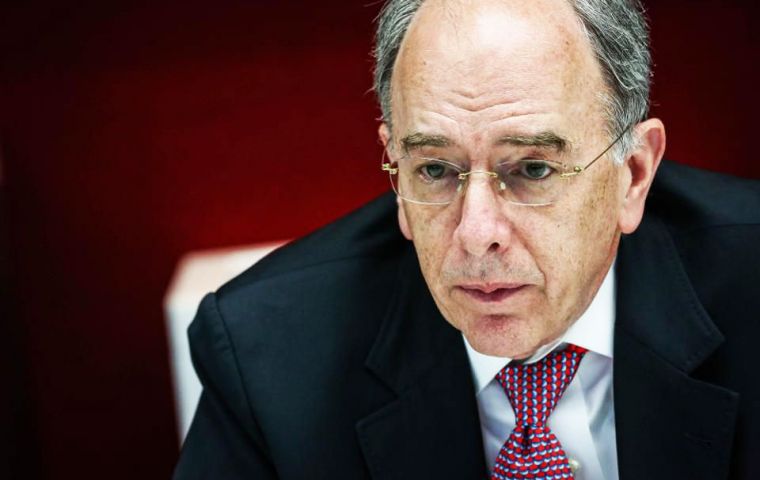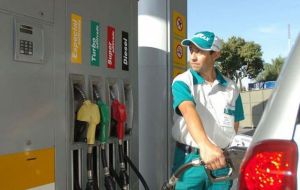MercoPress. South Atlantic News Agency
Brazil lowers diesel prices 10%, but truckers' strike continues threatening grain exports
 Petrobras CEO Pedro Parente said the price cut will only remain in place for 15 days and cost the company about 350 million reais (US$ 96 million)
Petrobras CEO Pedro Parente said the price cut will only remain in place for 15 days and cost the company about 350 million reais (US$ 96 million)  Price adjustments at Petrobras have let the company track global prices and turn a profit on fuel sales after losing money for years at the government’s insistence
Price adjustments at Petrobras have let the company track global prices and turn a profit on fuel sales after losing money for years at the government’s insistence  President Temer chief of staff, Padilhas met with the truckers but failed to reach an accord after the government did not present a plan to reduce diesel costs
President Temer chief of staff, Padilhas met with the truckers but failed to reach an accord after the government did not present a plan to reduce diesel costs Petrobras on Wednesday temporarily cut diesel prices by 10% in order to help the Brazilian government and truck drivers resolve a protest crippling highways.
The surprise decision, aimed at resolving a standoff threatening grains exports, industrial output and even fuel supply at airports and gas stations, will bring immediate relief for angry truckers but raise investor concerns about government interference at Petrobras.
New York-listed shares of Petrobras fell as much as 7.5% in after-market trading, after closing 3.8% lower on Wednesday.
Petrobras Chief Executive Officer Pedro Parente said the price cut, which will only remain in place for 15 days and cost the company about 350 million reais (US$ 96 million), had not been demanded by the government.
“The independence of Petrobras has not been damaged,” Parente said at a news conference explaining the decision.
“It was an exceptional measure and does not represent a change to our pricing policy.”
Near-daily price adjustments at Petrobras have let the company track global prices and turn a profit on fuel sales after losing money for years at the government’s insistence — part of a turnaround that lifted shares nearly 90% since the pricing policy started last July.
While Petrobras’ price cut brings momentary relief to truckers, policymakers struggled to reach a more lasting accord during talks with the drivers’ representatives in Brasilia, who threatened to extend their protests into a fourth day.
Late on Wednesday, Brazil’s lower house of Congress approved the main text of a bill aimed at resolving the protest, with the measure now passing to the Senate. In addition to eliminating the CIDE tax on diesel, it cut the PIS/Cofins tax on the fuel to zero.
Before the bill’s passage, congressman and rapporteur for the bill, Orlando Silva, said it would reduce the final cost of diesel by 14%.
Earlier in the day, the government and truckers groups met at the office of Eliseu Padilha, President Michel Temer’s chief of staff, but failed to reach an accord after the government did not present a plan to reduce diesel costs, a spokesman for ABCAM, which represents the protesters, told reporters after the meeting.
Padilha, calling the meeting tense but fruitful, said there would be another meeting on Thursday. He said lost tax revenue would be offset with additional payroll taxes.
It was the first such meeting between the government and truckers since they began partially blocking roads in several states on Monday to protest surging diesel prices.
Temer had called for “a type of truce for two or three days at most for us to find a satisfactory solution for Brazilians and for the truckers.”
However, ABCAM said the strike would continue.
Brazil is a key global supplier of grains, meat, coffee and sugar, most of which reach ports by road. Concerns that the protest could halt shipments of Brazil’s record soy crop have contributed to the steepest rally in soy futures in 10 months in Chicago trading, with prices up 4.5% in four consecutive days of increases.
According to Petrobras, state and federal taxes make up 29% of the final price of diesel paid by consumers. The average retail price of diesel is now 3.595 reais per liter, more than one US dollar.




Top Comments
Disclaimer & comment rulesCommenting for this story is now closed.
If you have a Facebook account, become a fan and comment on our Facebook Page!